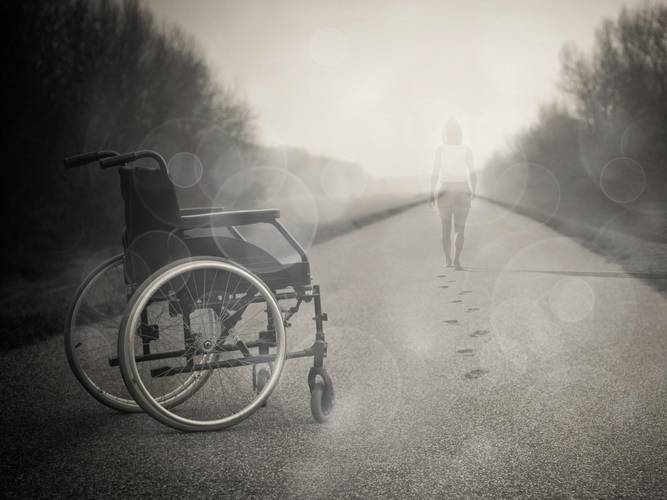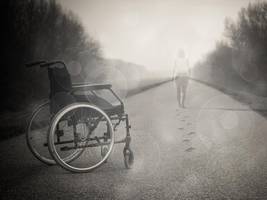The Ombudsman believes that it is possible to reduce the scope of the previously recognised right to personal assistance if the individual is provided with another service comparable in terms of the scope of assistance needed. If prejudice to a previously recognised right is possible without at least an approximately proportional replacement of the necessary assistance as part of another service, it may be a encroachment on the provisions of Articles 14 and 50 of the Constitution of the Republic of Slovenia (equality before the law and the right to social security). The complainants believe that the amount of personal assistance granted to the individual, on whose behalf they contacted the Ombudsman, should not be reduced (to such extent) due to the use of the service, which brings him welfare, but does not compensate him for the needs for which he was granted the right to personal assistance. If individuals cannot enforce their view on the matter through a legal remedy, this may be contrary to the provision of Article 22 of the Constitution of the Republic of Slovenia (equal protection of rights). The Ombudsman informed the complainants of his point of view and presented them with the possibilities of asserting their views through legal means, whereby it would be possible to determine whether there might be an incorrect interpretation of the provision of Article 9 of the Personal Assistance Act (ZOA) in the administrative procedure or whether this provision could be in conflict with the Constitution of the Republic of Slovenia. The complainants informed the Ombudsman that they had already turned to the Constitutional Court of the Republic of Slovenia.
* * *
The Human Rights Ombudsman of the Republic of Slovenia (the Ombudsman) was informed by the complainants of the situation of a person who is granted the right to a personal assistant under the ZOA, but whose right is reduced by the number of hours of involvement in an educational programme (Article 9 of ZOA). The Ombudsman had some concerns related to the aforementioned article in the past, but this time the circumstances were different: the person entitled to personal assistance was included in a distance education programme and is not guaranteed any physical assistance by being included in the educational process.
The Ombudsman drew the attention of the Ministry of Labour, Family, Social Affairs and Equal Opportunities (MDDSZ) to the issue, which did not recognize it, despite the fact that it did not explain what the substantive difference is, which justifies the distinction between the position of a person entitled to personal assistance who is not included to the implementation of the educational programme from Article 9 of the ZOA, and the position of a person entitled to personal assistance, who is otherwise involved in the implementation of such an educational programme, but remotely, which means that the individual does not receive any physical assistance from the programme provider, which is otherwise provided by personal assistants. The provision of Article 50 of the Constitution of the Republic of Slovenia in conjunction with Article 14 of the Constitution of the Republic of Slovenia stipulates that similar positions of individuals are treated similarly and different ones differently. When weighing the similarities and differences between the positions of different persons, according to the Ombudsman, it is always necessary to observe the factual content – in concrete cases, how much assistance the individual must actually receive with the "substitute" service referred to in Article 9 of the ZOA in order to still be considered to have been given proportionality between the received and the prejudice to the already recognised scope of the right to physical assistance from a personal assistant.
The Ombudsman also explicitly asked the MDDSZ for an explanation of how an individual can exercise their right in a case such as this one, when they otherwise agree with the decision on the recognition of the right to personal assistance, against which they have a legal remedy, but does not agree with the implementation plan, in which the reduced number of hours is defined.
The MDDSZ explained that, based on the applicable regulations defining the implementation of personal assistance, the individual is aware that involvement in other services that are financed from public funds will have to be deducted from the recognised hours of personal assistance based on the decision. Because of the aforementioned, legal protection against the implementation plan is not possible, as it is actually the exercise of the right granted to them by the decision. The MDDSZ also communicates that, in case of an individual who is home-schooled, the school is paid the financing of the programme, in which this individual is included, also for that individual. Therefore, it is the responsibility of the school or the educational programme provider to provide an appropriate way of implementing the programme.
According to the Ombudsman, an individual who believes that due to their participation in an educational programme that is implemented remotely or at home or in other cases where they believe that due to the application of the provision of Article 9 of the ZOA, the already recognised scope of the personal assistant's provided assistance is unjustifiably reduced, they must have the opportunity to assert their position by legal means. The mere fact, which, according to the Ombudsman’s opinion, should not otherwise prevail in justifying the prejudice to the rights of the person entitled to personal assistance, that the educational programme provider also receives funds for the providing home schooling, can then together with all other facts, in accordance with the assessment of the decision-making body, considered in the procedure regarding the filed legal remedy.
The Ombudsman informed the complainants of his point of view and presented them with the possibilities of asserting their views through legal means, whereby it would be possible to determine whether there might be an incorrect interpretation of the provision of Article 9 of the Personal Assistance Act (ZOA) in the administrative procedure or whether this provision could be in conflict with the Constitution of the Republic of Slovenia. The complainants informed the Ombudsman that they had already turned to the Constitutional Court of the Republic of Slovenia. 9.6-44/2022

